Oral History: The Oral History
Probably inevitable: An oral history of oral histories. Related: the oral history of Rocktober.
Do You Have Garbage Taste in Music? A Quiz
by Rob Tannenbaum

1) Who is your favorite Beatle?
A) John: +0 points. B) Paul: +1 point. C) Ringo: +0 point. D) George: +5 points.
2) Who is your favorite musical Jackson?
A) Michael Jackson: +0 points. B) Janet Jackson: +0 points. C) Wanda Jackson: +0 points. D) Jackson Browne: +5 points.
3) How many members of the Indigo Girls can you name?
For each one, +5 points.
4) Do you own any jazz records?
A) Yes, many: + 0 points. B) No, none: +3 points. C) I own one jazz album, “Kind of Blue” by Miles Davis: +3 points. D) Yes, I own several Kenny G albums: +5 points.
4) Have you paid money to see the Beach Boys since “Kokomo” was released in 1988?
A) No: +0 points. B) Yes: +5 points.
5) Have you been to a Moody Blues concert, at any point in your life?
A) No: +0 points. B) Yes: +5 points.
6) Do you have a beard?
A) No: +0 points. B) Yes: +5 points.
7) Do you have a ponytail?
A) No: +0 points. B) Yes: +10 points.
8) Who is your favorite guitarist?
A) Jimi Hendrix: +0 points. B) Whoever is playing in Ozzy’s band: +1 point. C) Richie Sambora: +2 points. D) Guitars are passé, I listen only to electronic music from Berlin: +5 points.
9) Who do you think invented punk rock?
A) The Ramones: +0 points. B) The Stooges: +0 points. C) The Sex Pistols: +0 points. D) Green Day: +5 points.
10) At the gym, what playlist do you listen to?
A) Madonna: +0 points. B) Lady Gaga: +0 points. C) Rihanna: +0 points. D) Susan Boyle: +5 points.
11) The coolest new band I’ve heard lately is….
A) Micachu & The Shapes: +0 points. B) Fuck Buttons: +0 points. C) The xx: +0 points. D) Jefferson Starship: +5 points.
12) What is your favorite Bob Dylan album?
A) Blood on the Tracks: +0 points. B) Blonde on Blonde: +0 points. C) Time Out of Mind: +0 points. D) Greatest Hits, Volume Three: +5 points.
13) Rap is….
A) An expression of the modern black experience: +0 points. B) The greatest new art form of the last 30 years: +0 points. C) An evolution of ancient African traditions: +0 points. D) The last three letters in crap: +5 points.
14) Where did you get your AC/DC t-shirt?
A) Angus Young gave it to me backstage: +0 points. B) Stole it from my older brother: +0 points. C) Bought it at an AC/DC concert: +0 points. D) Bought it at Urban Outfitters: +5 points.
15) When it’s time to put on some “bedroom music,” what do you play?
A) Maxwell: +0. B) Alicia Keys: +0. C) D’Angelo: +0 points. D) Justin Bieber: +5.
TOTAL SCORE:
0–10: Take the quiz again, and this time tell the truth.
10–29: You could probably get by with a smaller iPod.
30–59: So, when did you become a music blogger?
60–85: You have totally garbage taste in music! Are you the guy who lives upstairs?
Rob Tannebaum is the co-author of I Want My MTV: The Uncensored Story of the Music Video Revolution
. “Hugely readable and fun” says Pitchfork! “One of my favorite books of the year” says USA Today!
Book Reviewed
Everyone says it is much more difficult to write about something you enjoy than it is to trash something that is deserving of such treatment. Which is all the more reason to celebrate a positive review done so well that it transfers the critic’s good feeling for the book to your sense of the book itself. Here’s a good example.
Saving Earth: Why Bother?

“International attempts at climate regulation have failed on a number of levels. With CO2 emissions rising much more than predicted between 2009 and 2010, the goal of capping global warming at a maximum of 2 degrees Celsius now seems elusive. But political interest in changing course has waned,” reports Der Spiegel, ending with a rather grim quote from Jochem Marotzke, head of the German Climate Consortium: “The laws of nature will continue to function without remorse no matter what mankind does or allows.” This is so very true that it seems unnecessary to even worry about anymore. There will be fire. There will be flood. There will be chaos and catastrophe. But they won’t happen all at once. By the time the evidence is so utterly incontrovertible that even the most ardent science-deniers of our age will be forced to admit that, yes, we did this to ourselves, they will be long dead and we won’t even have the satisfaction of mocking their memory, because we will be too busy trying not to be burned, eaten or drowned. It’s all going to end in agony, so you might as well enjoy yourselves while the whole thing plays itself out. If you’re one of the lucky ones you’re going to pass on before it all comes crashing down anyway (sorry, kids!) so what difference does it make if you crank the A/C instead of opening a window? Not that you’ll need to do either this weekend: we’re looking at brisk, sunny days as far as the eye can see. Yep, the future is bright. Have fun!
Photo by edenpictures, via Flickr
How They Got There: A Conversation With Author Robert Sullivan
by Noah Davis
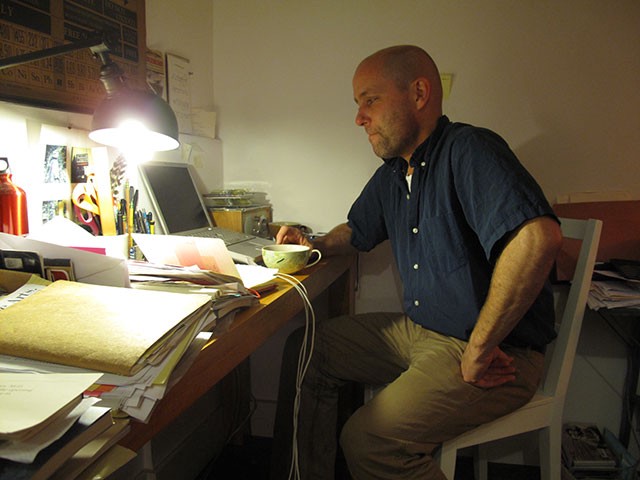
Robert Sullivan is almost certainly the only man in the country with a holiday greeting card from Anna Wintour on his fridge and a bestseller about rats on his resume. The former exists because of his 20-year gig as a contributing editor at Vogue; the latter comes as a result of the year he spent observing and chronicling the urban creatures as they lived their lives in an alley near Ground Zero.
In the Brooklyn apartment he shares with his preschool teacher wife and two teenage kids — one who recently took off for college with most of his father’s drum set in tow — Sullivan explained how a life spent crisscrossing the country and writing led to cards from Ms. Wintour, discussions about rat sex with Terri Gross, and an “accidental bestseller.”
In a couple paragraphs, how did you get here?
I was planning on being a musician, either a world-famous jazz drummer or a completely unknown session drummer. As a result, I ended up reviewing concerts in college, and then I ended up reviewing plays. I thought I should probably be a world-renowned playwright. I somehow got a job as a copyboy at The New York Times in college, thinking that would get me into more plays or something? It was amazing to be at the State Department taking down some comment for the bureau from the Secretary of State or else handing a letter to the Secretary of State for the bureau, and then seeing a version of that on the front page the next day. I had nothing to do with the writing, but I had taken the call from the dissident faction of some government, and the White House reporter used a line. I thought that was so cool.
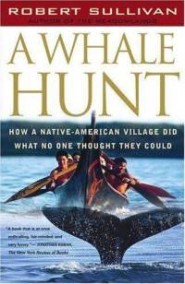
I got a job in New Jersey out of college covering rural New Jersey and then urban New Jersey. I quit because I heard that freelance writers made a lot of money. That turned out to be bad information. So, I started painting houses, and I got a job fact-checking at Condé Nast Traveler. I would call Bulgaria at odd hours and ask them questions about hotels. It was really fun. Then, I got a job at a magazine called Seven Days. I went around the city writing fun stories. They closed, and I moved with my wife to Oregon where she’s from. I pretended I was a foreign correspondent, and I wrote for people in New York. I thought, “Oh, I should write a book about that place I used to hang out in,” which was the Meadowlands in New Jersey. I wrote another book about a whale hunt in the Pacific Northwest. Then, I wrote a couple more books. We moved back to New York City in 2000 or 2001. We moved up the river to Hastings-on-Hudson, where I think I wrote another book. We moved back to Brooklyn, and we’re here now, right?
You still play the drums?
I still play the drums. I have the snare drum right over there, but my son has most of the set at college.
Is he going to be the famous drummer?
You know, as far as kids and vocation, I just wake up every day and hope they don’t become a freelance writer. As I mentioned, I got bad information.
What would you tell your 20-year-old self? Don’t be a freelance writer?
You know, William Carlos Williams was a doctor and he wrote. Even [work in] insurance, like [Wallace] Stevens. And then you can write in your spare time.
Was there a moment where you thought you had made it as a writer?
No, I don’t think so. Usually I feel as if it’s not working out. That’s the drive for everything. I don’t think I’ve ever had that moment. I would like to have that moment. That would be good.
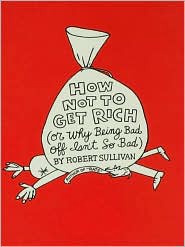
You wrote a book called How Not to Get Rich: Or Why Being Bad Off Isn’t So Bad. Personal philosophy?
There are roughly 600 copies right in the room next to us.
It was before the Great Recession, and clearly, everybody read it. They didn’t buy it. It seems as though they took it out of the library. The whole country took it out of the library, read it, and we went into a Great Recession.
[Laughs] No, it’s my favorite book as an object because I did it with a friend, Scott Menchin. He’s an amazing artist. We both really like Ben Shahn, and we were both really into this idea in the ’40s, ’50s, ’60s where artists would do a book together. There’s a book by E.B. White and James Thurber called Is Sex Necessary? I wondered why people weren’t doing more of those types of books. At the same time, I had done a number of books and everything kind of worked out, but there’s never enough: college, rent, and all these things you have to pay for. And yet, to put it in a corny way, there’s so much great stuff that has happened to you. It felt like a good time to write about how things are really good even though they never work out on a financial end. The best thing about that book is the cover and the pictures. The words are secondary, but I’m so proud to be the secondary part of a primarily good project.
How much do you write every day?
I work on a lot of magazine pieces. I write a lot for Vogue. I’m probably doing something for some piece for them every day. Right now, I’m doing a story for New York that’s taking me a long time. I think I wrote 1,000 bad words today for them that will probably have to be re-written. I have this other idea for this other thing that’s probably not going to work out. This morning, early, I wrote 1,200 words for that. On Sunday, I was planning to write a lot, but I did not write anything. I think I made notes about what I was going to write, but today I can’t find them. If I have a big story due and it’s that week, then that might be a 5,000-word piece. But, simultaneously, in my “free-hyphen-lance” life, I have to be working on a book at the same time otherwise I die. There’s the Woody Allen line about how a relationship is like a shark and it has to keep moving. Someone recently told me that when sharks mature, they don’t have to keep moving. So, I don’t know. Do I have to not move anymore? I don’t know. Everything is a big question mark for me.
Do you have a formal strategy? Something like your wife go to work and the kid(s) go to school and you start working?
The idea is to get up as early as you can, because nobody calls early. Five and six in the morning, nobody calls.
My formal strategy is some days you just have to go running. You have to give yourself a day off. New York is so expensive and even when you have a cheap apartment, it’s still expensive. It’s expensive to have kids, but if you don’t have kids, it’s expensive because you’re here or there. There’s so much pressure to figure out a way that you forget how valuable days are where you just take the afternoon off and are in New York.
My wife and I went to the American Academy of Artists across from the Met. I’d never ever been there. There’s a room in there that’s from the early 1900s. It has wood panels and high ceilings. All the walls are covered with paintings. And they are American paintings. I should be in that room every day. I would be a much more productive person if I spent six out of eight hours every day in that room. I can’t imagine if I hadn’t gone in that room.
A reviewer called you “a mischievous reporter on the universe.” Is that a fair description?
Yeah, that’s a good one. I should probably stop after that and not write anything else. That’s perfect.
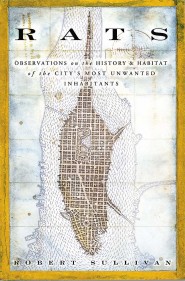
You wrote a bestseller about rats. That’s pretty awesome.
Yeah, it was an accidental bestseller. That’s important to remember.
I think they all are, aren’t they?
Rats spelled backwards is “star.” So, that’s underneath the reason why people bought it. I also used to joke that a lot of people would come to readings and all of a sudden they would leave because they thought it said “cats.”
Why did you write Rats?
I had been on this whale hunt, and I had been living up in the Olympic Peninsula. I had been at a reservation with this Native American tribe. They were hunting a whale, and many people were upset with them. They said, “You don’t want to hunt a whale. You’re Native Americans, and you love nature.” At some point during this time, there were a lot of animal-rights groups there. I was with them and they mentioned that they had rats at their office. They said they got an exterminator, and I asked if they exterminated the rats. They had, and I thought, “That’s the creature that’s the line in the sand as far as what’s natural and what’s not natural.” I love opposites, and I love reverses. I wanted to write a book about these creatures that are not considered natural but write a nature book about them.
The great thing is that this creature is completely associated in its living habits with humans. You get into this excellent place where you can secretly be talking about something else when you’re talking about rats. Of course, I was talking about humans and crowds and cities. That’s all I want to do. I love when you’re writing about something, but you’re also writing about something else. That’s so hard to get there, but it’s always where I’m hoping to be. Maybe twice in my life I’ve been there.
Any good rat stories?
Actually, I just heard a rat story that falls into a category of rat stories that are new to me. A guy told me he saw a rat in an apartment, his mother’s apartment. He set a trap, killed it, and put it into a garbage bag. He took the bag outside and dropped it into the garbage can. As he was walking back inside, he heard a sound, a scratching, and then saw the rat that was killed leaving the can. It’s a rat resurrection story, a rat Lazarus! Amazing.
And then about a week or so ago I was running across the Brooklyn Bridge, at about five thirty in the morning, in the dark, and I saw something to my right on the ground in my peripheral vision and then felt a weight on my foot. It was as if I were suddenly carrying something on my foot, in the instep, and then just as suddenly the weight was gone and the gray blur I had seen to my right was out in front of me and then quickly dashing off to my left — a rat that I had accidentally footed. For me, the most amazing part was that I had not interrupted the rat in his straight line across the bridge’s path. I did not cause him to deviate. I shouted an obscenity because it scared the crap out of me.
I assume you’re excited about writing that book. And I assume your wife is at least pretending she’s excited about it. And maybe some friends, but what are your expectations? “I’d like to sell 1,000 copies?” “I’d like to be done with it?” Does that even cross your mind?
Done is a big thing.
When you choose a topic, you think to yourself, “Am I going to be able to live with this idea for a long time?”
In a way, I have all the stories. I’m trying to finish the three or four ideas I’ve had for a long time. This book about the Revolutionary War, I’ve been nuts about Colonial encampments. Not in a big way, but I remember covering the reenactment of the Battle of Brooklyn in 2001.
When I went to write Rats, it’s something I’ve been thinking about. I love these places where rats are. And I wonder to myself if I could write a whole book about rats. It would be kind of cool because you’d get to go to some amazing places. There are some pretty interesting landlord tenant disputes about rats. As far as editors go, I’m just trying to keep it interesting. I’m thinking of a couple of friends and my wife. Would she want to read this sentence? Would Dave down the street be at all interested in this? And if I think they would, then it’s good.
Still, I imagine talking to Terry Gross about rat sex on NPR was not somewhere that you ever imagined being.
You don’t meet her when you’re talking to her. And I think that’s probably better because I carried a stuffed rat around with me. But yeah, I think that when you have the most fun, when you’re the most psyched, then it’s not completely surprising that someone else would pick it up as well.
How do you keep that excitement?
Drinking. Mostly I’m drunk. [Laughs] No, I have sort of a problem where I’m over-caffeinated, even without caffeine. Many people ask my family how they can stand it. If you look around, my wife is a teacher and an artist. The Revolutionary War is all over the house. All these quilts [that she made] are all based on ideas in the book. We live with ideas, so I get to see what I’m thinking in a way that I could never imagine because she’ll make a quilt.
It sounds incredibly stupid, but it seems as though it’s so easy to dig around and find cool stuff about so many topics. There’s no shortage. The sky has been amazing for the past two weeks with the fall, the season changing, and the mist coming from Jersey City. I walked down to the water. It’s all about finding this year or this two-year’s saddle that we’re going to put on it. It’s all about gearing up to march into the world with a slightly different outfit, but the same direction.
Do you have a skill set that suits that type of job?
I think a better question is, “Do I have a skill set?” [Laughs] I don’t think I have a skill set. I think that’s why I do this.
The Thoreau You Don’t Know. Who came up with that title?
I’m sure it was me under duress. I think it was my editor, too. Titles are really hard. I like really short titles. I like Brown, Black, Rats. Dead is really the title I’m working for. [Laughs] As much as that’s a joke, I think that really might be. Rats is pretty close to Dead. Swamp is pretty close to Dead.
Do you have a hard time explaining your job?
My son jokes that everybody goes away, and I’m home with the silk robe, cigar, champagne, big slippers. And that’s what I do all day.
It’s not fair for me to complain. The really, really, really, really great thing about my job is that I can go out and walk my wife to work. But a goal of mine when I became freelance, which was when Seven Days closed, was that I would go to movies during the day because they are cheaper. I’m not sure I’ve gone once.
Recently, someone asked me if I wanted to go and I thought, “This is it. Today is going.” I was getting kind of desperate. Are we still going? And then all of a sudden, he says, “I don’t think I’m going to make it.” “What do you mean?” And we didn’t go.
In Brendan Gill’s book, Here At The New Yorker, there was a page that I used to have when I had a drawer in my desk. It was the definition of ‘freelance.’ It was: “Free to starve.”
But I don’t know if I’ve made that goal.
Who should I talk to next?
Marty Skoble. He is a poet and a dancer (or was a dancer), and is mostly someone I think of as a poetry teacher, an amazing poetry teacher. I think the guy is amazing. An amazing teacher, an amazing teacher of poetry. Teaches little kids, big kids, teaches poets you have heard of. Once a bunch of high school boys walked into a poetry reading he put on, having won their game, and proceeded to read their poems — a poem in itself.
Previously:
Noah Davis is frequently lost.
'Margin Call' as Inefficient Propaganda
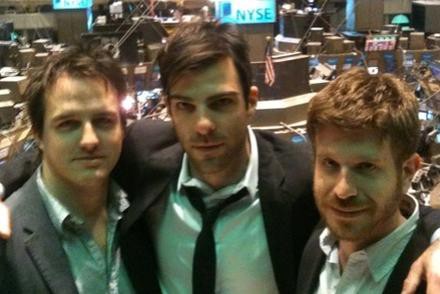
Here is a very negative take on Margin Call, the new “thriller” (it’s not really) about a boutique Wall Street firm that suddenly finds out that it’s been engaged in garbitrage (did I just make that up??? Google says “not really”) and its VOLATILITY METRICS ARE THROUGH THE ROOF and OMG SELL SELL SELL THIS CRUD TO DEUTSCHE! Which is kind of hilarious. I love that there’s a movie with a plot based on analysts and graphs. Also Demi Moore gives her best performance ever, and of course I’m including her star turn in Charlie’s Angels. Also MARY MCDONNELL is in it, deliciously briefly, and I’d watch dog food commercials if she starred in them. So while describing the film-going experience as spending “107 valuable minutes of your life hate-watching poorly-scripted/directed banker-propaganda that tries to make you believe that, despite their obvious flaws and all, deep down those Wall Street bankers are complex human beings, just like you and me” is technically correct, it’s also technically correct that people on Wall Street are complex human beings, just like you and me! And actually the film is pretty clear that, in speed-selling off a heap of dung to get out first, the fictional film and its fictional brokers and risk management folks are just being the biggest jerks imaginable — not tortured heroes, but pretty much Grade A Assholes. But yeah, it’s kinda silly. And also: just so phenomenally functionally untrue, though I appreciated their detailed approach to financial math. I did spend about a third of the film trying to make up some puns about Quinto and quants. (I spent another third gazing upon Zachary Quinto’s randy eyebrows.) Anyway, while it’s a problematic movie politically, and fascinating/unbelievable, is it more problematic than The Skin I Live In and it’s vast rapeyness? Whatever, this is all moot now, the new Harold and Kumar is out, and that’s a flick we can all get behind. (Seriously, best franchise ever.) (via)
Adam Gopnik And The Bourgeois Guillotine
Adam Gopnik And The Bourgeois Guillotine
by Maria Bustillos and David Roth
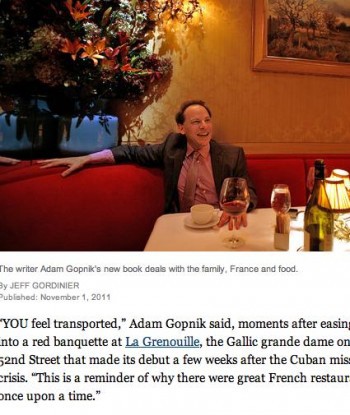
David Roth: Let’s talk about how Adam Gopnik feels about French food.
Maria Bustillos: OMG HE REALLY LIKES IT.
DR: Which is perhaps the least surprising thing one could learn about Adam Gopnik. I guess if it were somehow to be revealed that he is blown away — to the point where he thinks you might also find it fascinating — by some things his kids said at the Museum of Natural History, that might be less surprising. But I’m kind of with him on this one, to a great extent. Who doesn’t like food?
MB: Well, you! That is to say, I have noticed that awful food, at least, exerts a terrible fascination over you. You get like a deer in the headlights and immediately set about making it worse and worse, until we arrive at Tex Wasabi Kickin’ Dippin-aise.
DR: That is kind of true. But like 80% of that is because I’m a child and as such am amused by gross things. But the thing that makes me mad about Garbage Food is that it’s everything all the time. Want bacon? Have some fucking bacon!
MB: Oh, I intend to. I had some just today in my Cobb Salad and it was so spectacular. It’s the best part of Cobb Salad.
DR: That is absolutely true! And I think it’s wise to eat it if you like delicious things. Enjoying tasty food isn’t decadent or unethical in some essential way. It’s only that way if you’re decadent or unethical in terms of shoving it into your maw.
MB: I was a vegetarian for some years when I was a kid, but conflicted about it. Because I came to realize that if someone were to lock me up without food and then offer me a hamburger it would, at that time, take maybe two or three days of inner wrangling, and then I would be scarfing that thing down. And by that time it would be in terrible condition probably, that hamburger.
DR: With today’s hamburger technology, you’d probably be fine. They’re like 70 percent space-age polymers and epoxies. The main difference between a Whopper Jr. and a fireproof blanket is the shape.
MB: It is still a ground-up beast, though, largely. Our bodies are weirdly made in such a manner that eating other once-living things will keep them going. Why?
DR: Ask the universe? Same reason we’re born in sin?
MB: I have been asking the universe for ages with no results whatsoever. So anyways, about these fancy foods. The thing that made me want to talk about this was how very angry people were getting at Gopnik and those sophisticos who were profiled in T, like on Twitter. Just livid, they were. The words “bourgeois privilege” were bandied about.
DR: Which is hilarious, because 1) you are reading an article in T The Unbearable NYT Luxury Supplement, and thus any nausea or sudden urge to guillotine a bunch of people is all your fault and 2) cf. point one. I know that finding things unbearable is basically the Internet’s business, and those people with their heavily curated cocktail selection and luxury pork were indeed kind of unbearable to me, but you have to know what you’re getting into.
MB: Okay, PLEASE, now, you have to explain this to me, what is unbearable… is it the double-barrelled name? The hair gel? They seemed like perfectly nice, pleasant kids to me, having their wee dinner party.
DR: It’s the luxury prose. So much food writing, as DFW pointed out and as has remained entirely exactly the same since he did, is basically fashion-mag stuff, with foie gras where the cashmere used to be. T The Unbearable NYT Luxury Supplement just took it to the next level of giddy soul-barfery. That’s what T The Unbearable NYT Luxury Supplement does. The people are probably fine or fine-ish.
Someone comes over and takes a photograph of your sink, talks about your mason jars, you know, it is impossible; no one’s dignity could survive that kind of advertising-speak.
MB: That’s what I thought, it’s like so what, the man likes whiskey. Or whisky, whichever it is. But yes, the writing, it’s definitely a little bit crazy. Artificial, I mean. Someone comes over and takes a photograph of your sink, talks about your mason jars, you know, it is impossible; no one’s dignity could survive that kind of advertising-speak.
DR: Or advertorial-speak, or now-school Bret Easton Ellis-speak — name brands wherever possible, and every rivulet of opulence scrutinized and leered over until it’s about to burst into flames.
MB: Here these kids, and also Adam Gopnik, are trying to have a lovely time. On the whole, that seems harmless to me. But the luxury angle really drives certain people wild.
MB: And I’m thinking okay, how exactly are we supposed to do this? Isn’t it all posing, to some extent? I love the relatively raunchy dining habits of e.g. Anthony Bourdain, but carting him all over the globe to film him sampling whatever innards, you know, he is not exactly the common man. But he’s not going to get yelled at.
DR: That’s where the luxury prose is probably unfair to the people. Who may or may not be unbearable, I don’t know, but who are honestly probably just going to get fresh food for a dinner party, which is something everyone who has dinner parties does. When I was reading the T The Unbearable Luxury Supplement piece, I found myself trying to edit out all the extraneous luxuro-detail. We read that the lady rides her vintage Schwinn (with wicker basket) to the farmer’s market.
DR: Which, my natural instinct is: fuck your vintage wicker, there’s a riot going on, or some other armchair-radical whatever. But the relevant point is: “lady goes to market,” which is fine! The problem is tarting it up with brands and cutesy-poop curlicues. All of which seems almost designed to be mocked, but which certainly is designed to turn everyone in the piece into a model for some lifestyle brand or other.

MB: I’m not even sure why we’re supposed to like it, really. But T The Times Unbearable Luxury Supplement is like a passel of Craigslist ads compared with How To Spend It, the Financial Times one.
DR: Oh boy. Can’t talk about that. I tried to read it once and got really mad. On the subway. Did I sputter? Maria, I might maybe have sputtered a bit.
MB: The ads are all, like, some huge watch the size of Jupiter dangling over this futuro-goofball polo field atop a skyscraper. It warrants more guffawing than sputtering, I would say. Though I get it, I do.
DR: #DubaiBoners
MB: Point taken, also, about the basket, though I see girls riding around on those bikes all the time, and I think they are cute. They’re like they’re having their own movie montage with the flowers in the basket.
DR: Hey, if girls want to be cute, I’m all for it. To me, the idea of smart people getting seriously exercised about, like, Zooey Deschanel is to me far more decadent and ridiculous than beefing with some yuppies for preferring artisanal pork or whatever.
DR: “Let us have a conversation about how Zooey D. did with the national anthem at the World Series. Did you barf-cry? Did you ejaculate? LET’S FIGURE THIS OUT.”
MB: It’s true, I went and watched it expecting this excruciating event and exploding Katy Perry boobs or something and it was just this kid blah-ly singing?
DR: That’s her, all right. The thing with food that invites this sort of over-response, I think, is that 1) it comes from living things (even not-that-guilty meat-eaters like me know this) and 2) that it’s so loaded.
MB: WHAT do you mean loaded. This is exactly what I want to know.
DR: Like Adam Gopnik bandying about burgundies with a man in a tux at La Grenouille while humans are sleeping on grates is kind of objectively nauseating. And I suspect Adam Gopnik would agree with that. (It’s also not as bad, to my sensibilities, as some hedge-fund beastmaster ruining everyone’s night at Peter Luger.)
MB: Yes and no. If you’re going to be nauseated by that, you’re going to have to be nauseated by the bowl of granola that you have and a starving baby doesn’t.
DR: Right. Well, it’s a complicated life, this first-world life. And once you get into the bourgeois-response hall of mirrors, it’s really tough to say or do much of anything. I’ll say this much for Gopnik, whose writing I generally hate: I do not think there is any pretense there. He is excited to eat a fancy souffle in a fancy French restaurant. Full fucking stop. He likes French food and French things. He’s not doing it so you think he’s worldly. Of course, that is also the thing that makes his stuff so terrible for me.
MB: TOTALLY agree about Gopnik’s authenticity. He is completely guileless, it seems like. Sometimes I like his writing, I have sympathy with him because he is smart and means well. But anyway: you don’t have to travel too far to see that just a regular middle-class life, including granola and a clean place to sleep, is insanely rich, right? I don’t even know what “pretension” means or where the line should or even could be drawn. Though I was shocked to the core when they went and poured sabayon into his Grand Marnier souffle. Over the top, literally and figuratively.
DR: Pretension for him would be if he pretended to give a shit about the world. All those plump aphoristic asides and bons mots and whatnot, the fucking Talk of the Town pieces in which his kids quip about dinosaurs — those are very deeply felt and fully inhabited dorky-dad things.
A world without fancy restaurants isn’t a world I would like very much, even if I can’t afford to take my wife there.
MB: I remember someone writing a profile of Gopnik like at The New Yorker itself, I think it was, calling him “adorable.” Maybe that is a little tricky, for a grownup. It’s one way of coping with existential terror, maybe, is to take refuge in the adorable, in safe, silly things, and creature comforts.
DR: I don’t like his writing, but I can see the adorableness. If he were my dad — and he is kind of almost my dad — I’d love him. The only thing I dislike about his writing, or only things are 1) lack of focus and 2) that it’s eating up pages that anyone else in The New Yorker could be on.
DR: (Incidentally, Gopnik is responsible for the WORST food metaphor of all-time: he compared the smell of NYC immediately after September 11 to smoked mozzarella, which is both incorrect and wrong.)
MB: GAH, that is terrible!! Well, if it were up to me, Remnick and Hertzberg and Anthony Lane would write the whole thing every week.
DR: We are doing a really good job of savaging bourgeois distance, you and I, with our urgent and informed New Yorker beefs. Savaging or embodying, one of those.
MB: Savaging, embodying, it’s true, I find the whole business confusing, totally impossible to figure out. We are so bourgeois I guess, so how can we ever get away from being what we are? How do you get far enough away to judge it all properly… and that’s why all the fury is so perplexing, too; it always comes from the fellow-privileged. So, here is the other side of the luxury argument. I really love a fancy restaurant, now and then. Love the vocabulary of old-fashioned things, love knowing a lot of old things, that is to say, I deliberately try to go in certain Gopnik-like directions myself. Is there even a way to enjoy a little bit of luxury responsibly? These are beautiful things that are like winning the war against entropy. Just for a second.
DR: And I think there is really something, in a weird way, to Gopnik’s sentimental attachment to fancy old-timey French restaurants. I was taken to some of those as a kid by my parents, and I remember the dazzlement fondly. Even if the food was not for my 11-year-old self. A world without fancy restaurants isn’t a world I would like very much, even if I can’t afford to take my wife there.
MB: Yes!! I think it would have been way less unnerving if they hadn’t mentioned his Savile Row suit, maybe.
DR: Right. But of course he has that. He’s rich! Not his fault, necessarily.
MB: It’s like, he writes for The New Yorker, he speaks beautiful French, he loves the history of French menus. Is this cause for howls of à bas les aristos!!!?
DR: Nah, that’s just him being a doofy swell. The ridiculous unself-conscious rich will always be with us, and I feel like more power to him as long as he doesn’t spend his money trying to privatize Social Security or institute a flat tax. The thing with food, though, and with French food in particular, is that it’s such an old-style signifier of indolent wealth. All that butter, all those sad foie gras geese.
MB: Kind of wallowing in the decadence of it is a thing people scold. All that cream and red wine. (guiltily: Yum!)
DR: Right, yum. But the other side of French food is that the greater part of it is peasant food, right? Like, no one eats snails because they are SO DECADENT. Snails are sort of objectively gnarly snot-wads, and I can only assume they wound up on plates because they move so freaking slowly. (I am sort of talking out of my ass here, but I do know that snails are not very fast)
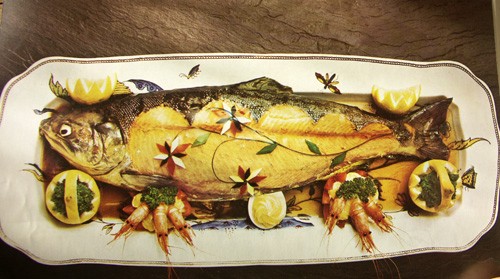
MB: Provencal cooking kind of came in after the war, I think? Elizabeth David helped popularize it most. But before that, French restaurants imitated court food, Parisian food. Escoffier and Carême and all those guys invented that super-fancy, fussy cooking, the cream sauces and the puff pastry and Lobster Thermidor. These immense, formal 18th- and 19th-century meals were the model for a long time.
MB: I’ve got some beautiful illustrated books of classic French cooking, full of wonderful photos of things I wouldn’t even dare to try, these crazy aspic-decorated truffled chickens, a five-foot croquembouche, hallucinations in spun sugar. I love looking at that stuff.
DR: Me too. There’s something kind of charmingly out of touch about all that old-style rich-person food. If you read it with a different intonation, “Let them eat cake” kind of applies here.
MB: By the way, I also love the idea of your being 11 and going to these places.
DR: My parents couldn’t afford the really high-end ones, but it was important to them. Food is really important to them. Butter is really important.
MB: I just wanted to dress up and hang around in there, when I was a kid. It was a big deal to my parents, too, to have those special-occasion kinds of evenings.
DR: My dad was 34 and my mom 32 when I was born, or thereabouts. They had this whole life before, which involved a decent amount of going to France and eating. So they have all these stories of getting food poisoning in Marseilles or staying someplace kooky in Brittany or my dad eating choucroute and farting a lot.
MB: Ha. That makes for a good marriage I bet, to have plenty of before-the-kids time. Well, my parents were from Latin America (Cuba and Venezuela, respectively) and they loved traveling and good restaurants, and going out dancing; they were spectacular dancers. The cocktail era.
DR: Mine couldn’t party that well. But where some parents have stories about seeing bands or whatever, my parents’ are all about eating at Taillevent or such in Paris. That was their decadence, before I came along and things got real neurotic-like.
MB: I am DYING to go there, I am sorry!!
DR: I’ve been! Which is very lucky of me. And you know what? Adam Gopnik is a goofball and a sentimentalist and whatever else — but it was fucking great. Just about the best meal I’ve ever had, and not at all un-fun for all the formalities.
MB: a;ldfjksldfj!!! If you have been to Taillevent you are totally not allowed to complain about Adam Gopnik EVER.
DR: I know, I know.
MB: Foodwise, I mean. But I am glad you went!!
DR: I don’t know if I even need to mention this, given that I write jokes about Papa John for a living, but I didn’t pick up that check. It was their 30th anniversary gift to themselves, and my sister and me. It was crazy. There were Juan Gris and Joan Miró paintings hanging all over the dining room and the food was ridiculous and everyone was very formal but also really gracious and clearly proud of how great the food was. We were all very butter-drunk walking back to the hotel. I should just fucking guillotine myself.
MB: No, it is awesome and I totally demand that you guys take me there, also.
DR: Oh, we can expense account that shit. Choire and Alex would be delighted to pick that up for us, I’m sure.
MB: Oh! Oh, boy. I won’t say no, should that fine day ever come. They’re so kind and lovely at Taillevent, everyone says.
DR: I got a roast chicken with my father and it was — at the risk of being A Gopnik — kind of a big deal for us.
MB: Roast chicken is my favorite dinner in the world!! I order it all over. I also make a pretty good one. Yes! I buy the fancy super-chicken at the farmers’ market, and just try to give me grief. No bicycle, no basket!
DR: Artisan wicker. You are an artisan wicker motherfucker, my friend.
MB: Worse! I drive over there in my beloved old Jaguar.
DR: It is very hard to talk about this subject without coming out sounding like a total turd, though; rich-person calories and poor-person calories have totally different semiotic weight in re: their relative irresponsibilities. They’re coming from the opposite ends of the universe, but if there’s anything that unites me shaking my head at Gopnik and also shaking my head at, like, Taco Bell’s XXL Cheesy Aneurysm Gordita Crunchwich, it’s the unexamined excess, not the excess itself. The T The Unbearable NYT Luxury Supplement shows us people who think too much about food and drink and everything — or it makes them look like that — but at least they’re kind of thinking about it. But you’re way more likely not to do something gross or sad if you think about the food, right?
MB: I don’t know, David. Maybe we can think about these things too much, as well as too little? But I can’t help but believe we should think about everything, if we can. I’d like to know how to behave sensibly and ethically, about food and everything else.
DR: And if you’re cool with going for it, go for it, but think about it. That’s the great lesson of “Consider The Lobster,” and everything else. It is not that simple.
MB: slow clap
DR: /Explosion Sound
Maria Bustillos is the author of Dorkismo and Act Like a Gentleman, Think Like a Woman.
David Roth co-writes the Wall Street Journal’s Daily Fix, contributes to the sports blog Can’t Stop the Bleeding and has his own little website. And he tweets!
An Interview with X-Men's Cyclops, Who Sucks

Q. Let’s talk about the personnel change that many say redefined the X-men. The entire team left, except for you!
A. Yes. I wanted them to stay, but they ignored me.
Q. You had to rebuild the team from scratch.
A. It was the hardest time for me as a leader. There was no one to lead.
Q. What was your role in the recruitment of the new cast of international heroes?
A. I mostly had to be patient while the Professor recruited them. It was very difficult.
— This fake interview with Cyclops, of X-Men, is really funny… FOR MEGA-NERDS.
